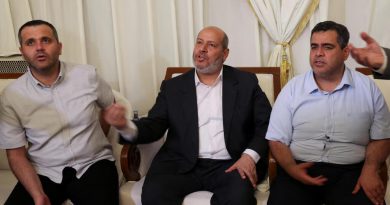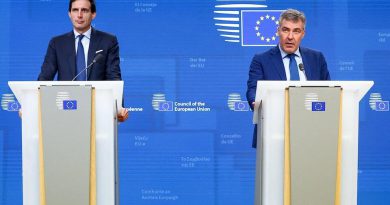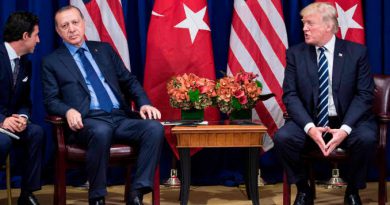The Biden-Modi relationship is built around mutual admiration of scrappy pasts and pragmatic needs
Washington (AP) — No one would mistake them for best of friends.
But U.S. President Joe Biden, the son of blue-collar Scranton, Pennsylvania, and Indian Prime Minister Narendra Modi, who rose from tea seller’s son to premier, have developed a relationship based on mutual respect of their scrappy backgrounds and a pragmatism about the shared challenges their two countries face.
Biden is hosting Modi for a state visit this week as he looks to tighten his relationship with the leader of a nation of 1.4 billion that the U.S. administration sees as a pivotal force in Asia for decades to come. The pomp-filled visit will mark the two leaders’ 10th in-person or virtual engagement since Biden became president in 2021. They’re expected to meet again in September in India at the Group of 20 summit.
The U.S.-India relationship is complicated. There are deep differences over Russia’s war in Ukraine and India’s human rights record.
But the frequent engagement between the leaders is seen by both sides as a reflection that, whatever their personal dynamics, Biden and Modi see the U.S.-India relationship as a defining one in the face of an increasingly assertive China and monumental challenges posed by climate change, artificial intelligence, supply chain resilience and other issues.
“They get along well personally, but even more important, I think both realize it is in the interest of the U.S. and India to advance the relationship,” said Arun K. Singh, a former Indian ambassador to the U.S. “For both Biden and Modi, there is a convergence of interests and you can see both leaders are invested personally in moving ties ahead.”
Biden and Modi haven’t developed the sort of tight bond that President Barack Obama had with Modi’s predecessor, Manmohan Singh.
Singh was the first leader Obama honored with a state visit during his presidency. In his post-presidency memoir, “A Promised Land,” Obama heaped praise on the former Indian premier as “wise, thoughtful, and scrupulously honest” and credited him as the “chief architect of India’s economic transformation.”
Nor will Biden and Modi be co-headlining raucous stadium rallies like Modi and President Donald Trump did together in Houston and Ahmedabad, Gujarat. Trump likened Modi to Elvis Presley for his star appeal at a joint rally in Houston in September 2019 that drew about 50,000 people to NRG Stadium. The two leaders more than doubled that crowd about five months later with a massive rally at a cricket stadium. In Ahmedabad, Modi praised Trump as a “unique friend of India,” and Trump called Modi “an exceptional leader.”
Even without big rallies, though, the Biden White House says there is still plenty of evidence that the U.S.-India relationship is growing.
Trade between the U.S. and India in 2022 climbed to a record $191 billion. Through the Quad, an international partnership of the U.S., Australia, India and Japan, the countries launched a plan in 2021 to donate 1.2 billion doses of COVID-19 vaccines to the Indo-Pacific.
Earlier this year, the two countries launched the Initiative on Critical and Emerging Technologies, which sets the path for collaboration on semiconductor production, developing artificial intelligence, and a loosening of export control rules that could allow U.S. defense contractors to transfer critical technology. U.S.-based General Electric is now awaiting approval from the administration to produce jet engines in India.
“I think with Biden you don’t have these explosive warmth moments,” said Richard Rossow, chair of U.S.-India Policy Studies at the Center for Strategic and International Studies in Washington. “But the tenor and pace of engagement has escalated quite a bit.”
The two leaders — Biden, a center-left Democrat, and Modi, a Hindu nationalist leading the conservative Bharatiya Janata Party — aren’t exactly cut from the same political cloth. Still, the leaders have connected over each other’s relatively humble beginnings, according to a senior Biden administration official.
The prime minister was the third of six children born to Damodardas Modi, who ran a small tea shop at the local railway station in the tiny town of Vadnagar, in the western state of Gujarat. The family struggled to make ends meet, which meant Modi had to help his father run the shop. Biden, who has been in elected office more than half his life, often speaks of his father’s own struggles to maintain a foothold in the middle class as shaping his own worldview.
Both leaders seem to appreciate each other’s “scrappiness,” said the official, who was not authorized to comment and spoke on the condition of anonymity.
The Biden-Modi relationship isn’t without tension. Biden last year publicly called India’s response to the war in Ukraine “shaky.” India abstained from voting on U.N. resolutions condemning Russia and refused to join the global coalition against Russia. Since the start of the war, the Modi government has also dramatically increased its purchase of Russian oil.
Human rights groups and press freedom advocates are also pressing Biden to publicly raise concerns with Modi about democratic backsliding in his country. Modi has faced criticism over legislation amending the country’s citizenship law that fast-tracks naturalization for some migrants but excludes Muslims, a rise in violence against Muslims and other religious minorities by Hindu nationalists, and the recent conviction of India’s top opposition leader, Rahul Gandhi, for mocking Modi’s surname.
Biden’s national security adviser Jake Sullivan suggested the president would raise his concerns with Modi.
“Anytime we see challenges with respect to press freedom, religious freedom, infringements on the democratic space, we make our views known,” Sullivan said. “We do so publicly. We do so privately. We do so in a way where we don’t seek to lecture or assert that we don’t have challenges ourselves. … And that will be the nature of the conversations that take place here over the course of the next couple of days.”
In the leadup to the trip, Biden administration officials have sought to focus on the countries’ “shared values” and India’s critical role in finding solutions to some of the biggest problems facing the world.
“If you want to make a dent in the energy transition, it’s not even remotely possible to do that without India,” Amos Hochstein, a senior White House adviser, told U.S. and Indian business leaders at a U.S. Chamber of Commerce gathering ahead of Modi’s visit. Hochstein added, “I think what brings Prime Minister Modi and President Biden together is great ambition.”
Biden and Modi have had their lighter moments.
When Modi came to Washington in September 2021, he brought with him documents about people with the last name “Biden” in India.
“Are we related?” Biden asked. Modi without missing a beat responded jokingly, “Yes.”
At the Group of Seven summit in Japan last month, Modi greeted Biden by wrapping him in a tight hug that grabbed headlines around India.
Nirupama Rao, a former Indian ambassador to the United States and China, says Modi has an “aptitude and a talent” for the softer skills of politics. It’s something that the Indian premier and Biden share, she said.
“This state visit, I think, affords an opportunity and provides the backdrop perhaps for Mr. Modi to develop a very good understanding with President Biden and vice versa for Mr. Biden,” Rao said.



